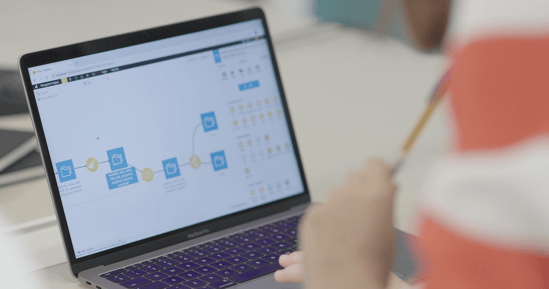When choosing a data science use case, it’s important to identify the potential business value (i.e., who will the project benefit, how will it change their current processes and habits), the level of necessary effort, and the likelihood of success (how much risk is involved). No matter the industry, often a great place to start for AI use cases is the office of finance within an organization, as the teams within that group work with a significant amount of data and do a lot of spreadsheet-based work. In this article, we’ll summarize why the office of finance (notably the tax, audit, and finance functions) are primed for AI transformation, as well as ways Dataiku can help bring them up to speed for a modern analytics strategy.
Why Start With the Office of Finance?
According to Deloitte, “We observe many isolated data silos within the office of finance, leading to various reconciliations, highly intense manual labor work, and an immense amount of data quality issues. A data-driven finance function recognizes the full potential of granular data, managing data as a strategic asset.” As mentioned earlier, the finance function includes many repetitive and routine tasks (monthly financial reporting, for example) which, by automating, will stand to benefit not only the analysts involved in compiling those reports and sharing them with stakeholders, but the business at large as the analysts will have additional time for more strategic, high priority projects.
With a constant need to meet and surpass expectations laid out by shareholders, regulators, and auditors, the office of finance can effectively reduce the time spent gathering data manually from a plethora of sources, which, in turn, can accelerate reconciliations and both internal and external report generation. In the same vein, tasks such as invoice reconciliation, receivables tracking, and payment logging have the potential to be much more streamlined via a data science platform through features such as permissions management, audit trails, and secure API access.
Further, as we’ll delve deeper into in the following section, using a centralized data platform for all data efforts can simultaneously help improve data quality. In a benchmarking survey of senior executives in over 1,200 companies, 38% cited ensuring data integrity and quality as the main challenge they face with data. By using machine-learning-enabled data quality technology for suggestions on tasks such as data labeling, offices of finance can reduce manual steps associated with data quality improvement.
We know what you’re probably thinking. Is identifying and implementing a data science and machine learning tool overkill for finance teams? Signs may be pointing that way, but the answer is actually no. While their low-hanging fruit use cases might be of the likes of automation and data prep, doing this kind of work in a tool that also allows them to do machine learning will mean they can do more advanced predictive modeling in the future — and, when they do, those projects can be more easily expanded and developed.

Tax, Audit, and Finance: How Dataiku Can Help
Across all three functions, Dataiku can help teams automate processes, transition out of spreadsheets and into a platform designed to scale, and save significant amounts of time. Not only are tax, audit, and finance arms collecting troves of data, but they likely aim to combine data from all available sources (conventional and alternative) to get a holistic view of their business. To gain access to the most recent data and save time, organizations must:
- Identify a consolidated repository for data projects, with a visible audit trail and data lineage (to easily do things like keep documentation of data sources with sensitive or proprietary information and see what data is being used where and who “owns” what data)
- Break down data silos, many of which are caused by multiple sources of truth and versions of the same data elements in various team member’s spreadsheets
- Move out of spreadsheet-based data prep and analysis in order to increase the size and number of unique datasets and complexity of data analysis
- Have the tools in place to do more advanced predictive work and build machine learning models when the team becomes more advanced
- Introduce concepts of reuse and capitalization in order to avoid tax, audit, and finance teams having to do the same data prep work over and over without knowing it may have already been done by another team (driving home the value in visual, repeatable workflows)
- Combine disparate data sources in a place where all team members can have visibility to them (without being limited by spreadsheets, especially for complex analyses)
- Mitigate risks that often result from data security problems or costly spreadsheet errors
The good news is that Dataiku can help teams accomplish all of these objectives. Specifically, actions can be logged and data pipelines can be viewed in a transparent way, enabling regulatory compliance to be monitored in real-time in order to ensure no surprises if an audit arises (in which case, AI can help automate manual work such as validation of customer data and customer data security operations).
Additionally, Dataiku offers a visual flow approach and step-by-step documentation, helping risk managers improve efficiency in model risk auditing and validation. To see how The Department of Taxes of the City of Amsterdam partnered with Dataiku to implement taxation and collection in a smarter, more efficient way, check out this video.
Today’s environment is undoubtedly challenging for all finance teams, particularly as they aim to reinforce risk management while tackling regulatory change and boosting agility across all legacy processes. A data science platform like Dataiku offers a more efficient, collaborative and scalable compliment to spreadsheets and a transparent workspace from which to develop data projects within the confines of regulation, providing a common ground for all profiles to work how they’re most comfortable and share knowledge across projects.





